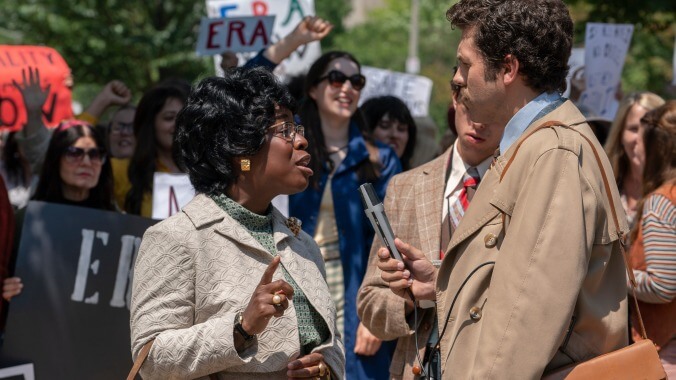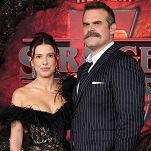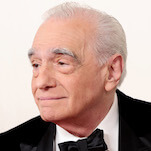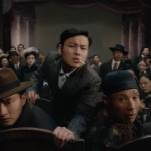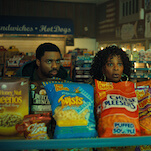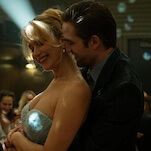It’s great to see Uzo Aduba in this dramatic role—it makes me wish we could get a series on just Shirley and her celebrated career, especially her win as the first Black woman elected to Congress. Instead, we focus on her run for president. We’re at the would-be end of Shirley’s campaign, though; she’s polling at 1% in the Democratic primary, with George McGovern a clear winner. Despite this, she decides to stay in the race until the Democratic National Convention. It’s 1972 and the ERA has been ratified by 18 states.
It’s a little painful watching this episode after our recent diverse Democratic primary that ended the way almost all of these primaries ended. The b-roll footage of interviews about having a female president is particularly painful considering how they seem to include a diversity of opinions that you don’t see often enough in media. Clearly, Shirley Chisholm’s run made history. But the glass ceiling didn’t seem as thick as concrete as it feels now.
An intriguing new detail about “Shirley” and the woman herself is how she’s being watched on a small scale as well. When Flo asks her about her Secret Service security, Shirley smirks and shrugs. “George Wallace got shot,” she says, referring to her rival’s near assassination. “They’re here to protect me.” “To protect? Or surveil?” says Flo, raising her eyebrows. “That man is always listening.” Reader, I laughed out loud. Shirley is constantly checking if her phone is tapped at her hotel room at the Democratic National Convention in Miami Beach, and even opens a vent and talks into it. It seems a little paranoid…except, of course, we know exactly why she’s right to do so.
What’s unfortunate is how Shirley’s other concerns are dismissed by the people around her. We know history—we know that McGovern barely shows up in the history books. But she’s told over and over again it’s time for her to drop out. Rep. Ron Dellums (Norm Lewis) of the National Black Caucus tells her that she seems to represent women more than Black people. Most egregious is how the National Women’s Political Caucus decides to endorse McGovern. While Betty Friedan is all in for Shirley, Bella outright calls Shirley’s campaign a joke. Shirley realizes they’re treating her as symbolic of what could be instead of taking her for what she is: an actual candidate. Bella attempts to take her comments back, but Shirley is stunned and frustrated that it’s not the NWPC’s immediate imperative to back her, but instead compromise and back McGovern.
And as the NWPC, especially Gloria, finds out, such compromises require such constant concessions as to not be worth it. They learn this first hand when they force a vote on abortion on the floor of the convention, as Gloria was adamant to do in the last episode. Despite the fact that Gloria got McGovern staffer Gary Hart’s (John Palladino) word, a McGovern staffer looking above the convention center says to turn face because “They might actually get the votes.” Dozens of men, who had very happily given women their seats so they could vote, start running back, eager to toe the party line. Gary Hart dismiss Gloria’s protests as she points out that they avoided talking too honestly about the brutality of illegal abortions specifically for this vote to go through. He tells her, “I’m sick of you women!” Gloria leaves the floor in tears, saying, “We’re just wombs to them.”
By contrast, before McGovern takes the floor, Shirley gives a rousing speech about her candidacy. Unfortunately, she still has to concede later. Even her husband Conrad (Brandon J. Dirden) says so. Let’s take a moment here to talk about the Chisholms’ marriage. Unlike Fred and Phyllis’ relationship, where there’s a fair bit of politics and compromise within the relationship, or Gloria and Frank’s relationship, where there’s a sense of abstaining and avoiding a settled relationship, the Chisholms have no such qualms or compromises. Conrad’s support does not come with strings, concessions, or a fight for power. Shirley is emotionally beside herself, breaking down in front of him after checking the phones again, and he’s there to calm her. Conrad is the antithesis of Fred—he’s with Shirley all the way.
Speaking of the Schlaflys, Phyllis is finding that compromise is the way to go for her and the STOP ERA group—that is, other women compromising for her. When various women from various chapters make speeches at a STOP ERA event, Mary Frances (Melinda Page Hamilton) of the Louisiana chapter of STOP ERA takes it to a racist place, talking about how terrible it would be for the genders to be integrated the way the races have. People clap uncomfortably, and later Alice tells Phyllis she should call out Mary.
Instead, Phyllis encourages Alice to call out Mary in front of everyone, which seems incredibly naïve of Alice. Mary Frances and several other women of the coalition start walking out, but Phyllis holds an “election” for Mary and convinces her to stay. She actually appoints several state leaders of STOP ERA, including her friend and neighbor Rosemary Thomson (Melanie Lynskey). Then Phyllis says they’ll have to use identical language in speeches and phone calls—for unity, of course.
In the end, Gloria, Bella, and Betty find McGovern’s candidacy too hard of a pill to swallow, their clapping desultory when he officially wins the primary. They liven up when Shirley appears on stage, their tears and love for her apparent. Too bad their compromise in a candidate isn’t going to make a difference in the long run. At least Shirley’s run will.
Stray observations
- Amma Asante, the director of Belle and A United Kingdom, directs this episode, which is how we get moments like Phyllis’ maid’s expression of disbelief when Phyllis tells her to take the Schlaflys’ cans of expired food.
- Speaking of canned food, Phyllis’s nuclear bunker is a reminder of where her passions (and fears) really lie.
- I’m going to be thinking of Alice’s line, “I’ve spoken with exactly four men,” for a while.
- If you wondered why you were thinking of Beyoncé throughout the episode, it’s because of the song “Are You My Woman (Tell Me So)” by the Chi-lites, which plays over b-roll of the DNC. Beyoncé sampled it for “Crazy in Love”; the use here is a clever way to parallel strong Black women in this episode without compromising historical accuracy.
- Fun fact: Before her Secret Service detail, Chisholm’s husband Conrad was her bodyguard.
- At one point, Aduba wears the exact outfit Chisholm wears in the main image of her Wikipedia entry.
- Martin Luther King, Jr. once called George Wallace “the most dangerous racist in America today” in 1968. Shirley still visited Wallace after the attempt on his life. A class act.
- I’ve probably lived in the Bay Area too long, but my first reaction to Shirley’s endorsement from the Black Panthers was, “Lucky!” Rep. Dellums was actually from the East Bay, and was Mayor of Oakland in 2007. It makes his thinking that Shirley doesn’t represent Black interests even more egregious! And it makes me think of this clip from the Golden Globes a few years ago.
